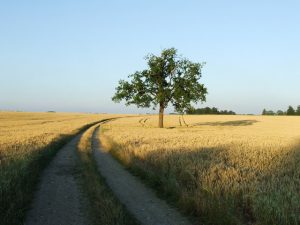
Ordinary time in Year B of the Revised Common Lectionary brings us back to the Gospel of Mark. I’m glad to be back.
Mark has a straightforwardness, an immediacy, that is always inviting. And it is short enough to read in a pretty easy sitting — a highly recommended practice if you want to see the subtlety underneath the simplicity. Mark seems so plain taken piece by piece as happens on a Sunday morning — but his telling of Jesus’ story is textured, patterned, rich.
Jesus enters with a splash in Mark — which is more than a pun on the baptism with which the Gospel opens. He calls Peter, Andrew, James, and John and then turns to healing — a demon-possessed man, Peter’s mother in law, a nameless crowd, a man with leprosy, a paralyzed man. He jumps into teaching as well, though we don’t hear much of the content. And the Pharisees have already begun to object.
And then we pick up the story in next Sunday’s lectionary text, Mark 2:23-3:6.
Mark 2:23-3:6
The cast is, as Captain Renault put it in Casablanca, “the usual suspects”:
- Jesus
- His disciples
- The Pharisees.
I always like to keep an eye on those Pharisees, by the way. They get some bad press, even in this passage, but they aren’t the cardboard cut-out villains preachers often make them out to be.
I think Jesus really liked them. They are always there, always asking questions, always engaged. I might argue that they were his target audience.
The Sabbath
The issue is the Sabbath — a topic as easy for Christians to misconstrue as the Pharisees.
First Jesus’ friends take gleanings from the grain fields, as is permitted to the poor in the Law of Moses (see Leviticus 23:22 and Deuteronomy 24:21). But it is on the Sabbath, and the Pharisees accuse them of unlawful work.
Second, in the synagogue Jesus encounters a disabled man. For the eagle-eyed pharisees this is a test case: will Jesus do the unlawful work of healing the poor guy?
Do Good, Save Life
Jesus’ teaching that one should do good and save life on the Sabbath was not news to the Pharisees. The mandate to save life is understood by the Talmud to override other specific prohibitions of actions on the Sabbath, and it is rooted in the Law of Moses.
So I need to look more closely to find what Jesus was emphasizing.
I think the thing to notice is that Jesus was interpreting the law to save life even on the Sabbath to include the need to alleviate suffering even on the Sabbath.
Jesus’ actions allowed a deeper rest to weary, suffering people.
- What is more wearying and distracting than hunger?
- What is more wearying and distracting than an injured or disabled body?
Helping the poor rest from hunger and helping a wounded man find health is fitting for the Sabbath. Feed and heal people–and then maybe they can focus on keeping the Sabbath.
This is not to say that every Lord’s Day should be filled with service projects. That’s the temptation of our activist culture. We misinterpret Jesus if we think that Sabbath rest is not required of us. Jesus did not say the Sabbath was unimportant. At the very least he showed up in the synagogue to worship.
If only I can get past the omnipresent (and often anti-semitic) polemics agains the Pharisees, I can look to what guided Jesus’ own actions that Sabbath day.
The Poor, Aliens, Widows, Orphans
What about that gleaning, the picking of grain? Look at the biblical passages I mentioned above:
When you reap the harvest of your land, you shall not reap to the very edges of your field, or gather the gleanings of your harvest; you shall leave them for the poor and for the alien: I am the Lord your God.” (Leviticus 23.22 NRSV)
and
When you gather the grapes of your vineyard, do not glean what is left; it shall be for the alien, the orphan, and the widow.” (Deuteronomy 24.21 NRSV)
Ah yes, my culture and I are challenged here. We want people to pull themselves up by their bootstraps. We would give to the poor, but only if somehow we deem them “worthy.”
God tells me to provide. Just keep less for myself, and let the poor have it:
- “aliens”? Think immigrants and asylum seekers;
- “orphans” and “widows”? Think single moms and kids in poor families.
Mercy — that’s what God calls me to, even on the Sabbath. I can’t evade the call to show to others the same mercy God has shown me, not even on the Sabbath.
++++++++++++
I’d love to send these Monday Meditations (which are sometimes, like this week, Tuesday Trepidations) straight to your inbox, along with my other articles and announcements. Just scroll down to the black box with the orange button to subscribe to my weekly(ish) newsletter and all this will be yours…

Leave a Reply